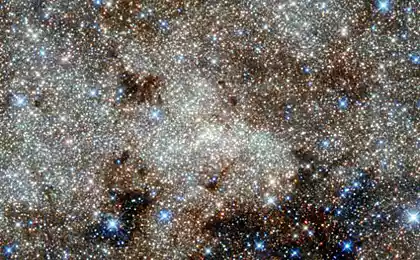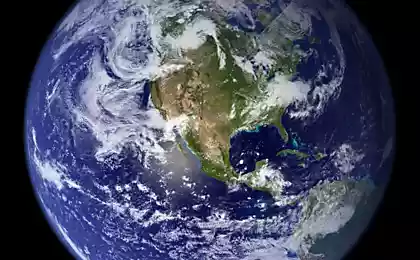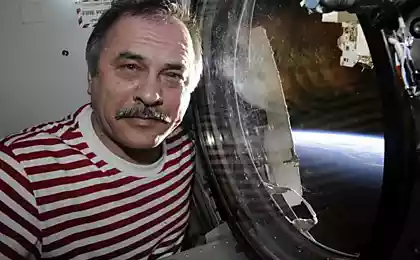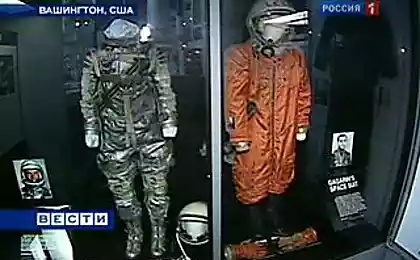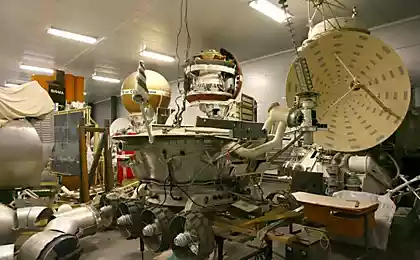959
To space will reach only those who are well nourished
Knowledgeable people say that since 1961, since the launch of the first space Korablin "East" in space visited by more than 400 people. And none of them never ate better than the present inhabitants of the ISS - Jeffrey Williams, Thomas Reiter and Pavel Vinogradov. The astronauts have to thank for such a good menu, the staff of a scientific institution which is continuously plead in their laboratories, as if anxious moms. This institution - Department of Food Support and cooking (Food Processing and Product Support) as part of USA (United Space Alliance).
The first rule - not to prepare astronauts for nothing crumbling, otherwise they will have to chase the crumbs across the station. The first, but not the only one. Over the past two years, staff requirements are much tougher. "This is not surprising, - says in an interview with The New York Times Vicky Kluris (Vickie Kloeris). - Food has become much more diverse. Many resignedly willing to do during the expedition meat and potatoes, but we aim to expand the menu, including but not limited to it dishes of national cuisine ».
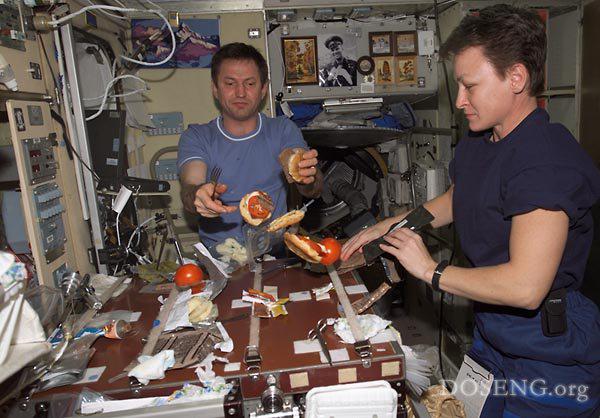
To cheer up the astronaut, it is necessary to resort to various tricks - they specifically come up in groups of psychological support. Using a large number of flavorings and spices - only one of them, but very important. In space, the sense of smell is dulled, as in zero gravity liquid from the lower part of the body moves to the top, because of what is happening blockage of the nasal passages. In addition, filtered and recirculated air with the smell of strange things happen, and cans and plastic bags, of which there have to severely limit the opportunity to enjoy the smell of hot food. A few months in orbit - and a bottle of sauce "Tabasco" or clove of fresh garlic seem an accomplishment.
Salt and pepper also will be very helpful, but only in liquid form. Grains of salt and pepper in microgravity will be hammered in every hole - in equipment, eyes and noses astronauts. The most common products can create unexpected problems. It was found that under conditions of weightlessness, fresh tomatoes, so beloved by our compatriots, you must first carefully cut, and only then bite. If the air gets a little juice to the last drop of his need to find and collect.
In space, even the Americans have to give up the habit of eating alone - the astronauts almost always eat together. Of course, the ISS crew members do not sit at the table and hover around in the air. To stay in one place, they use special brackets for legs, and a bottle of ketchup and cutlery on the table secured with Velcro straps. Well-educated people can enjoy not only a spoon, but even with a knife and fork, but the food should be at the same time quite sticky.
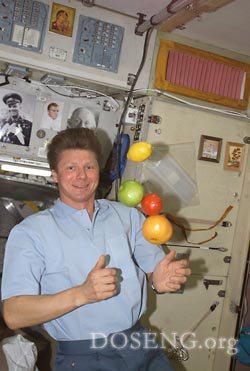
Now scientists from Houston solve the problem of how to prepare and pack food for planned missions to Mars. The shelf life of the products should be five years, because they will be launched into space before those to whom they are intended. Six months will it take to deliver the food to your destination, another six months - to fly astronauts and six more - on their return. In addition, it is necessary to provide an extra margin of time due to weather and technical problems. One of the most important among the latter - is the problem of "water activity", which could lead to an increase in the number of bacteria. A bacteria in space to anything.
The first rule - not to prepare astronauts for nothing crumbling, otherwise they will have to chase the crumbs across the station. The first, but not the only one. Over the past two years, staff requirements are much tougher. "This is not surprising, - says in an interview with The New York Times Vicky Kluris (Vickie Kloeris). - Food has become much more diverse. Many resignedly willing to do during the expedition meat and potatoes, but we aim to expand the menu, including but not limited to it dishes of national cuisine ».

To cheer up the astronaut, it is necessary to resort to various tricks - they specifically come up in groups of psychological support. Using a large number of flavorings and spices - only one of them, but very important. In space, the sense of smell is dulled, as in zero gravity liquid from the lower part of the body moves to the top, because of what is happening blockage of the nasal passages. In addition, filtered and recirculated air with the smell of strange things happen, and cans and plastic bags, of which there have to severely limit the opportunity to enjoy the smell of hot food. A few months in orbit - and a bottle of sauce "Tabasco" or clove of fresh garlic seem an accomplishment.
Salt and pepper also will be very helpful, but only in liquid form. Grains of salt and pepper in microgravity will be hammered in every hole - in equipment, eyes and noses astronauts. The most common products can create unexpected problems. It was found that under conditions of weightlessness, fresh tomatoes, so beloved by our compatriots, you must first carefully cut, and only then bite. If the air gets a little juice to the last drop of his need to find and collect.
In space, even the Americans have to give up the habit of eating alone - the astronauts almost always eat together. Of course, the ISS crew members do not sit at the table and hover around in the air. To stay in one place, they use special brackets for legs, and a bottle of ketchup and cutlery on the table secured with Velcro straps. Well-educated people can enjoy not only a spoon, but even with a knife and fork, but the food should be at the same time quite sticky.

Now scientists from Houston solve the problem of how to prepare and pack food for planned missions to Mars. The shelf life of the products should be five years, because they will be launched into space before those to whom they are intended. Six months will it take to deliver the food to your destination, another six months - to fly astronauts and six more - on their return. In addition, it is necessary to provide an extra margin of time due to weather and technical problems. One of the most important among the latter - is the problem of "water activity", which could lead to an increase in the number of bacteria. A bacteria in space to anything.








